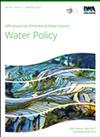Domestic institutions and international collective action problems: International water rights conflicts
IF 1.8
4区 环境科学与生态学
Q4 WATER RESOURCES
引用次数: 0
Abstract
To what extent do domestic institutions affect the solution of collective action problems in international waters? Dwindling water resources and dire climate change projections make the determination of water rights in international rivers a major source of contention among states. If the states cooperate based on integrated water resource management principles, they could achieve social equity, economic efficiency, and sustainability. Yet, many international rivers remain subject to unilateral exploitation. This paper explores the role of domestic institutions in facilitating the emergence of international water rights. Adopting a political economy approach, it presents a case study analysis of the dispute over the Euphrates and explores the complex interaction of governing institutions in achieving efficient water management. I argue that the solution to the collective action dilemma in water rights is the creation of property rights institutions, which requires high levels of trust and reciprocity among highly motivated actors, who are accountable to their people.国内机构和国际集体行动问题:国际水权冲突
国内机构在多大程度上影响国际水域集体行动问题的解决?水资源的减少和严峻的气候变化预测使国际河流水权的确定成为各国争论的主要来源。如果各州基于综合水资源管理原则进行合作,它们可以实现社会公平、经济效率和可持续性。然而,许多国际河流仍然受到单方面开采。本文探讨了国内机构在促进国际水权产生方面的作用。采用政治经济学方法,对幼发拉底河争端进行了案例分析,并探讨了管理机构在实现有效水管理方面的复杂互动。我认为,解决水权集体行动困境的办法是建立产权机构,这需要高度积极的行为者之间的高度信任和互惠,他们对人民负责。
本文章由计算机程序翻译,如有差异,请以英文原文为准。
求助全文
约1分钟内获得全文
求助全文
来源期刊

Water Policy
环境科学-水资源
CiteScore
3.10
自引率
12.50%
发文量
81
审稿时长
6-12 weeks
期刊介绍:
Water Policy will publish reviews, research papers and progress reports in, among others, the following areas: financial, diplomatic, organizational, legal, administrative and research; organized by country, region or river basin. Water Policy also publishes reviews of books and grey literature.
 求助内容:
求助内容: 应助结果提醒方式:
应助结果提醒方式:


